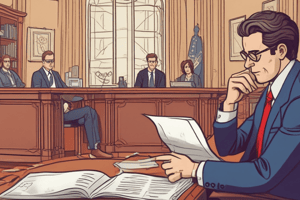Podcast
Questions and Answers
What is the primary focus of ethics codes like the ACA Code of Ethics and APA Ethical Principles for mental health professionals?
What is the primary focus of ethics codes like the ACA Code of Ethics and APA Ethical Principles for mental health professionals?
- Guiding court procedures
- Protecting client privacy and confidentiality (correct)
- Promoting counselor well-being
- Enforcing legal obligations
What rights do clients have in counseling consultations regarding their confidential information?
What rights do clients have in counseling consultations regarding their confidential information?
- Right to provide false information
- Right to access counselor's personal information
- Right to withhold all information from the counselor
- Right to know about potential disclosures (correct)
When counselors receive a subpoena, what should they do to minimize the disclosure of sensitive information?
When counselors receive a subpoena, what should they do to minimize the disclosure of sensitive information?
- Ignore the subpoena
- Fully disclose all client information
- Challenge the subpoena (correct)
- Use the information for personal gain
How should counselors navigate the interplay of confidentiality laws, legal obligations, ethics codes, and client rights when dealing with a subpoena?
How should counselors navigate the interplay of confidentiality laws, legal obligations, ethics codes, and client rights when dealing with a subpoena?
What should counselors do if faced with a subpoena and wanting to protect sensitive client information?
What should counselors do if faced with a subpoena and wanting to protect sensitive client information?
What do confidentiality laws, such as HIPAA, primarily protect in the context of counseling?
What do confidentiality laws, such as HIPAA, primarily protect in the context of counseling?
Which of the following statements is true regarding the protection offered by confidentiality laws when faced with a subpoena?
Which of the following statements is true regarding the protection offered by confidentiality laws when faced with a subpoena?
What is the consequence for counselors who fail to comply with a subpoena?
What is the consequence for counselors who fail to comply with a subpoena?
In what situation might a counselor need to consult with an attorney regarding a subpoena?
In what situation might a counselor need to consult with an attorney regarding a subpoena?
How should counselors balance their ethical responsibilities and legal obligations when dealing with a subpoena?
How should counselors balance their ethical responsibilities and legal obligations when dealing with a subpoena?
Flashcards are hidden until you start studying
Study Notes
Counselors consulting with attorneys when receiving a subpoena involves a complex interplay of confidentiality laws, legal obligations, ethics codes, and client rights. As mental health professionals, counselors are bound by strict confidentiality laws, which protect the privacy of their clients' sensitive information. However, these laws do not necessarily exempt counselors from legal obligations or ethical codes when faced with a subpoena. In this article, we will discuss the various aspects of this issue and provide guidance for counselors when consulting with attorneys in these situations.
Confidentiality Laws
Confidentiality laws, such as the Health Insurance Portability and Accountability Act (HIPAA) and state-specific laws, protect the privacy of clients' mental health records. Counselors must follow these laws and are generally prohibited from disclosing confidential information without explicit, informed consent from their clients. However, these laws do not provide absolute protection for counselors when faced with a subpoena.
Legal Obligations
When a counselor receives a subpoena, they face a legal obligation to comply with the request. Failure to comply with a subpoena can result in contempt of court charges and other legal consequences. Counselors must balance their legal obligations with their ethical responsibilities and the need to protect their clients' privacy.
Ethics Codes
Ethics codes, such as the American Counseling Association (ACA) Code of Ethics and the American Psychological Association (APA) Ethical Principles of Psychologists and Code of Conduct, provide guidance for mental health professionals in various situations. These codes emphasize the importance of protecting client privacy and confidentiality, while also acknowledging the need to comply with legal obligations.
Client Rights
Client rights play a crucial role in counseling consultations with attorneys. Clients have the right to know about potential disclosures of their confidential information, and counselors must inform them of any such disclosures. Counselors must also consider the potential implications of these disclosures on their clients' well-being and mental health.
Court Procedures
Court procedures can vary depending on the jurisdiction and the specifics of the case. Counselors should be aware of the court procedures in their location and be prepared to follow the appropriate steps when faced with a subpoena. This may include seeking a protective order, challenging the subpoena, or complying with the request while minimizing the disclosure of sensitive information.
In conclusion, counselors consulting with attorneys when receiving a subpoena must navigate the complex interplay of confidentiality laws, legal obligations, ethics codes, and client rights. They must balance their legal obligations with their ethical responsibilities and the needs of their clients. By staying informed about these issues and seeking appropriate legal and ethical guidance, counselors can effectively manage these situations and protect their clients' privacy.
Studying That Suits You
Use AI to generate personalized quizzes and flashcards to suit your learning preferences.




